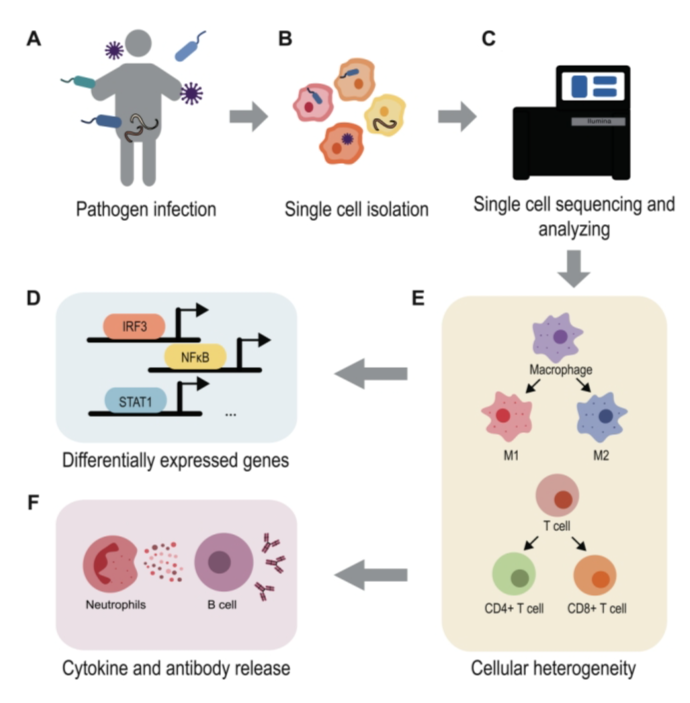Single-Cell Sequencing based Therapeutic Target Discovery Service for Infectious Disease Research
Single-cell sequencing technology allows for more precise and efficient detection and intervention of infectious diseases. Creative Biolabs provides single-cell sequencing services to help clients obtain more precise gene expression information and identify possible targets in infectious diseases.
Extensive Single-Cell Sequencing
-
Single-cell genome sequencing. Mainly applied to identify and analyze single nucleotide variants, copy number variants and chromosomal structural variants.
-
Single-cell transcriptome sequencing. Analyze gene expression, functional enrichment and metabolic pathways of coding and non-coding RNAs in single cells.
-
Single-cell epigenetic sequencing. Study of DNA epigenetic modifications, including methylation, hydroxylation and histone modifications.
-
Single-cell multi-omics sequencing. Such as single-cell dual-omics sequencing and single-cell triple-omics sequencing.
Single-Cell Sequencing Service Process
-
Sample collection. Provide competent sample collection instructions for various sample kinds and experimental applications.
-
Quality control and standardization, such as data cleaning, normalization and standardization to reduce noise and bias.
-
Single-cell sequencing. Reveal changes in the genome, transcriptome, and epigenome from the individual cell level to obtain gene expression data. Appropriate sequencing depth and coverage are used to ensure the completeness and accuracy of the sequencing results.
-
Data analysis. Provide comprehensive single-cell data analysis, including data preprocessing, cell clustering, cell type identification, and differential expression gene analysis.
-
Results delivery. Provide customized analysis reports according to your experimental design and research issues, including detailed experimental procedures, data processing methods, statistical results and graphical presentations.
-
Confidentiality and data security. All data are transmitted, stored and analyzed with strict security measures to ensure that the data are not leaked or misused.
 Fig. 1 Understanding host-pathogen interactions using single-cell RNA-seq.1
Fig. 1 Understanding host-pathogen interactions using single-cell RNA-seq.1
Strengths of Single-Cell Sequencing in Infectious Disease Research
-
Highly specific. Single-cell sequencing technology allows the sequencing of individual cells, resulting in more precise gene expression data and better resolution of intercellular heterogeneity.
-
High throughput. Single-cell sequencing technology allows the sequencing of a large number of cells simultaneously, thus obtaining a large amount of data and improving the efficiency of research.
-
Powerful analytical capabilities. Numerous analytical methods and tools have emerged, such as cluster analysis, single-cell DEG analysis, and cell trajectory inference.
-
Discovering new cell types and subpopulations. Single-cell sequencing technology can help identify and discover more cell types and subpopulations, especially in complex tissue samples, and is able to resolve cell populations with small differences.
-
Stronger discovery capabilities. Single-cell sequencing technology can detect new genes without prior sequence information and has greater sensitivity in quantifying rare variants and transcripts.
Single-cell sequencing allows researchers to investigate how host cells behave in response to pathogens and why they have different susceptibilities, improving the understanding of the mechanisms of infection to the pathogenesis of infectious diseases. Creative Biolabs provides single-cell sequencing services to help clients analyze immune profiles and the corresponding immune signaling pathways in infectious disease research and identify new immune cell subtypes and biomarkers for infectious diseases. Please contact us with interest.
Reference:
-
Huang, Wanqiu, Danni Wang, and Yu-Feng Yao. "Understanding the pathogenesis of infectious diseases by single-cell RNA sequencing." Microbial Cell 8.9 (2021): 208.
For Research Use Only. We do not provide direct services or products for patients.
Related Services:
 Fig. 1 Understanding host-pathogen interactions using single-cell RNA-seq.1
Fig. 1 Understanding host-pathogen interactions using single-cell RNA-seq.1